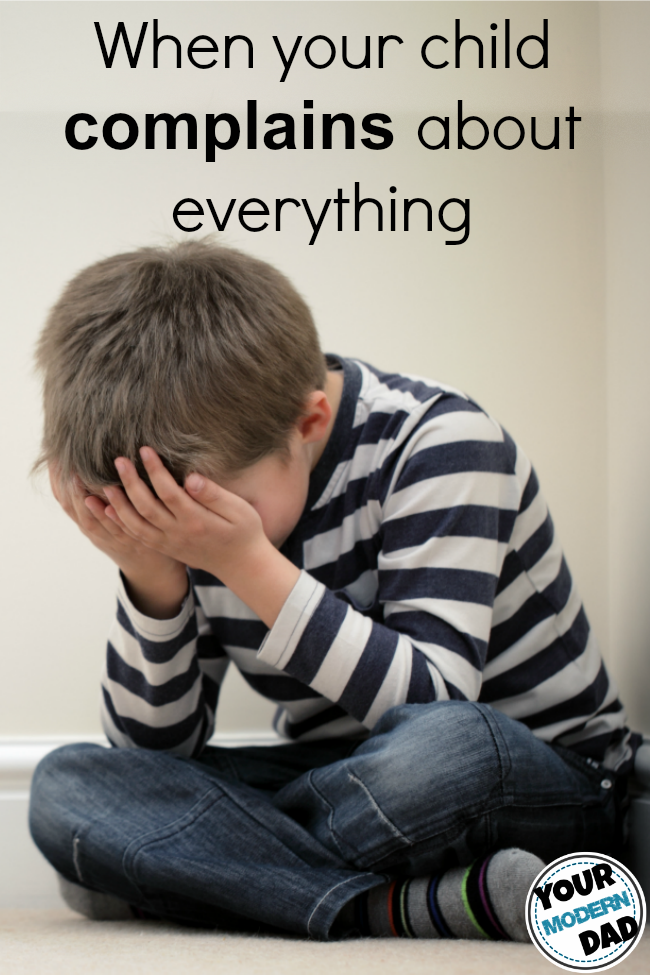Becky & I both come from families where we were taught not to whine or complain about things. We were taught to be grateful, to take care of our things and to appreciate what we were given.

When our kids start complaining, we have tried everything to stop it.
We’ve tried being patient and we’ve gone the opposite and just become frustrated.
We’ve tried time outs and we’ve tried more one on one time.
Sometimes you just can’t take it anymore and that’s when you dig deeper. We read a few of our favorite parenting books and we really thought about what could be done about it and we found a few tricks that work. (We pulled some together for you today)
(Background: Becky has a degree in elem. education with a therapy certification, so she has a lot of information, materials and resources on children and their behavior. We just had to find what worked & stick to it.)
1- Don’t change your child.
“Don’t try to turn your child into something she’s not. As a parent, you might feel you’re responsible for how your child feels and behaves. If so, the choices she makes will feel very personal to you. You’ll find yourself trying to turn her into a positive person, a “Negative Nancy” into the proverbial “Sally Sunshine.” The result? She’ll work all the harder to resist you. This will cause you to push harder, creating more and more reactivity and negativity between the two of you. Remember, you’re not responsible for the choices your child makes about her attitudes or behaviors. Instead, you’re responsible for how you respond to these attitudes and behaviors.” ~ Debbie Pincus, MS LMHC, empowering parents.com
2- Listen…
“According to the U.S. Department of Health and Human Services, the simple art of listening to your child is one of the most basic, but most effective, ways to prevent your child from engaging in risky behavior. Moreover, reports from the Office of National Drug Control Strategy indicate that strong family bonds can prevent children from developing drug problems. Whether he’s 2 or 12, if you feel that you’re not spending enough one-on-one time bonding with your child, try enhancing the time that you do have by simply talking and listening to him when you’re cooking, eating dinner, shopping or driving.” ~
Becky bought me this journal– it is for the kids & I to write back & forth to each other. Most of the times we draw pictures, but the point is that we’re bonding and they like it.
3- Find the source
“Try to identify where some of your child’s bad attitudes are coming from. For example, one father noticed his son’s frustration worsened after playing video games. After limiting the child’s computer time, he saw an improvement in attitude. Perhaps your child is mimicking the behavior of someone else — a parent, sibling, friend or even TV character — who complains or criticizes.” ~ Scott Turansky imom.com
Get his book here, Good and Angry: Exchanging Frustration for Character in You and Your Kids
4- Solve the problem
“If your child is complaining to you about something, encourage him to solve the problem. If he says, “I’m hot,” while he’s playing outside, ask, “What do you think you should do about that?” If he needs help thinking of options, remind him he could sit in the shade or ask for help getting a cold drink.
Teaching your child problem-solving skills can help him see that coming to you and complaining isn’t likely to fix the problem. But, he can ask for help solving the problem or he can figure out how to solve the problem on his own if it’s age appropriate to do so.
When kids improve upon their problem-solving skills, they may be less likely to complain. And if you don’t jump in to solve every problem for them, you won’t create a sense of learned helplessness.”~ Amy Morwin Discipline.about.com
5- Encourage the positive
” Whether the problem is temperamental or environmental in origin, you can address it by making some changes in your parenting style and methods. Concentrate on eliminating your child’s penchant for complaining by ignoring him when he’s negative. Don’t give in to his dark mood. Don’t shower him with attention when he starts moaning and groaning about something. If he talks in bleak terms about his day at school or the birthday party he attended or some activity in which he’s just taken part, tell him you’re sorry he feels that way and then go about your business. Don’t prolong the discussion. Just move on.
On the other hand, when your son says anything positive or displays the slightest bit of enthusiasm, you should reinforce this behavior by smiling, praising him, and letting him know how much you appreciate his upbeat attitude. You could even begin rewarding him for positive statements and behavior by putting up a star chart on the refrigerator door and adding a sticker every time he says or does something that brightens your day.” ~ Focus on the Family.com
If this was helpful, sign up for my free weekly parenting tips of encouragement.


My child complains a lot and he’s my only kid. Thank you so much for this information!